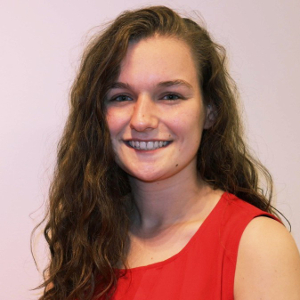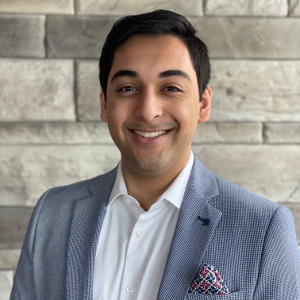Another summer has already come and gone, and that means that the 17 undergraduate students who embarked on a BioCanRx-funded research internship in cancer immunotherapeutics have also taken their leave. We are so proud of the way our summer students have learned and developed, and we want to extend our best wishes to them for the future!
Interested in learning more about the students’ various motivations and projects? You’re in luck: we asked two to expand on their summer internship experiences. Meet Shayna Earle, who worked with Dr. David Latulippe at McMaster University and Nikesh Chander, who worked with Drs. Manoj Lalu and Dean Fergusson at the Ottawa Hospital Research Institute.


1. Who are you? Where did you go to school? What’s your program? One fun fact about yourself!
SE: Hi everyone! My name is Shayna Earle I am originally from Rothesay, New Brunswick and am now working towards my degree in Chemical and Biomedical Engineering at McMaster University. A fun fact about me is that I have been synchronized swimming since I was 5 and am a member of the competitive team at McMaster.
NC: My name is Nikesh Chander. I grew up in the Ottawa area and am now at the University of Ottawa in my third year of an HBSc in Translational and Molecular Medicine. In my free time, I like to program games and play guitar!
2. Why did you want to do cancer research this summer?
SE: Cancer impacts millions worldwide and has become an aspect of everyday lives as we know it, however, I truly believe gene therapy is the future of cancer treatment. Having had the opportunity to work on the development of manufacturing oncolytic viruses for gene therapy, I was able to directly contribute to an impactful health care advancement. Not only do I find biomanufacturing intriguing from an engineering point of view, but also the use of oncolytic viruses adds a biological complexity that sparks my curiosity. Outside of my professional interests, cancer is something that has directly impacted my immediate family and I believe that any contribution I can make towards combatting this disease would bring me great pride and gratitude.
NC: I wanted to participate in cancer research this summer for a number of reasons. Most prominently, I wanted to contribute to clinically-relevant research that has the potential to positively impact the lives of as many people as possible. In my research, I hope to disseminate work that clinicians can use to produce more favorable outcomes for cancer patients in the future. I find the potential of helping others in cancer research to be extremely motivating and a major influence on the work I chose to pursue this summer.
3. What did you work on this summer? What did you discover?
SE: This summer I had the opportunity to work in the Latulippe Lab group at McMaster University doing a combination of experimental and economic simulation-based research focusing on therapeutic virus manufacturing. Modelling virus production for gene therapy using BioSolve software a range of scenarios and testing was conducted to identify steps which were key cost-drivers in the process and gain an understanding of the overall virus production beyond lab scale. Experimentally, I was able to design experiments that explored specific unit operations in terms of cost, effectiveness and compliance with regulatory requirements. The ability to cost-effectively manufacture viral therapeutics is essential to the development of novel cancer treatments.
NC: This summer I worked on a systematic review and individual patient data meta-analysis as part of the Blueprint group, co-led by Dr. Manoj Lalu & Dr. Dean Fergusson. The project aimed to explore and identify potential effect modifiers that could be impacting the efficacy and safety of chimeric antigen receptor (CAR) T-cell therapy in participants with hematologic malignancies. I extracted baseline, treatment, outcome, and adverse event data from 2053 individual participants across 96 CAR-T trials and found in preliminary analyses that cancer type, CAR-T target, and the number of previous treatments impact the achievement of complete response.
4. What was one memorable moment from this past summer during your studentship?
SE: Working in the Latulippe lab group, I was able to have many hands-on experiences both in the laboratory and at home doing simulation work. I am grateful to have been able to go into the lab despite the Covid-19 protocols. One of the key takeaways I will have from this experience is not only learning to be independent in a lab setting but also being able to design, adapt and adjust my experiments based on the findings. The iterative nature of research is something I have always found intriguing and being in a supportive environment that allowed me to step outside my comfort zone allowed me to learn more than I ever thought possible.
NC: My time working with the Blueprint group this summer was an amazing experience! I was extremely fortunate to work with a supportive team of individuals who allowed me to further develop my skills as a researcher. I enjoyed my experience presenting to the group and was particularly grateful for the opportunity to receive insightful feedback on my work, as well as on my scientific communication skills. This experience was very memorable and gave me valuable insight into the collaboration that is required in research.
5. How did this research experience impact your career development?
SE: My degree and course work bridges the gap between engineering and health sciences, where the chemical engineering portion focuses on process development. These skill-sets align directly with the tools needed to work in the area of biomanufacturing through biological and pharmaceutical knowledge coupled with optimizing manufacturing processes.
Gaining experience in the vast and growing field of biomanufacturing has opened my eyes to many future career possibilities. The connections I have made through this research and my hands-on experience allowed me to develop skills and knowledge that I hope to use for years to come. Pharmaceuticals and improving the manufacturing of new treatments can play a key role in treatment cost and as by-product accessibility. Working to make novel treatments more feasible and optimizing existing processes is the type of work I hope to do long term. The connections the BioCanRx studentship gave me this summer have acted and will continue to act as a critical step in reaching my goals.
NC: This experience solidified my desire to pursue a career as a clinician-scientist. Long-term, I want to work in a career where I can make a difference in patients’ lives both through direct treatment and indirectly via the dissemination of practice-changing research. This summer studentship has provided me with valuable experience in a field of research I hope to pursue and has further developed the skills that will be required to attain my career goals.
6. What is your hope for cancer treatment/care in the future?
SE: First and foremost, I hope that cancer treatment will be a reality for a wider range of conditions, even at their most advanced stages. However, more so than this I hope that these therapies will be widely accessible to all populations. The pharmaceutical industry presents many barriers, but by developing impactful novel treatments that are also cost-effective more patients will get the life-saving treatment they need. Whether this be improving current methods or the implementation of novel therapies, finding the cure is as important as getting the cure to patients.
NC: I hope for a future where all forms of cancer are treatable in a safe and effective manner. A future where cancer patients do not fear their diagnosis, but rather are able to fulfill long, healthy lives. I believe this future will rely on an abundance of cancer therapies that each act most effectively on particular cancer patients with specific baseline characteristics, allowing clinicians to select the most suitable treatment option for each patient.
7. General input from research supervisor:
Do you have any tips or feedback to prospective summer students?
Scientific research is often misunderstood – one of the biggest challenges is to first develop the question that needs to be answered. And then once you strive to answer that question, as a previous mentor once told me, it is important to view research as re-search, that is the process of searching again and again for the answers. As Martin Schwartz said so elegantly in his 2008 article ‘The importance of stupidity in scientific research’ (go now and read it!), “One of the beautiful things about science is that it allows us to bumble along, getting it wrong time after time, and feel perfectly fine as long as we learn something each time.”
Being a summer student is an awesome opportunity to see how science and research operates from ‘the inside’. Be prepared to be a team player and use your time to work on your communication skills. We hope you will learn a lot by working closely with senior members of our research group.